Home | Category: Islam and the Qur’an / Muslim Beliefs / Islam, Muslims, God and Religion
FIVE PILLARS OF ISLAM

The Five Pillars of Islam (“arkan al-din”) are the fundamental observances of Islam. They are: 1) reciting the profession of faith (“the shahada”) by declaring, “There is only one God and that God is Allah and Muhammad is His prophet.”; 2) praying five times a day ( “salat” in Arabic); 3) giving of alms to the poor (“zakat”, zakah in Arabic); 4) fasting (“sawm”. abstaining from dawn to dusk from food, drink, sexual relations, and smoking) during the month of Ramadan (the ninth month of the Islamic calendar), the holy month when God's revelations were received by Muhammad; and 5) making the pilgrimage (“hajj”) to Mecca at least once during one's life if possible. [Source: Library of Congress]
One of the Five Pillars addresses to the manner in which a non-Muslim becomes a Muslim. The other four belong to the ritual aspect of the religion. Each of these commandments is mentioned several times in the Qur’an, but there they do not appear as a separate group. However, in the Hadith (literature of Muhammad’s saying and deeds), the five commandments are grouped and referred to as the pillars on which Islam stands. In the collection compiled by al-Bukhari (d. 870 A.D.), we read: "Islam is built on five (pillars): Witnessing that there is no god but Allah and that Muhammad is the messenger of Allah, and the performance of prayer, and giving of alms, and pilgrimage, and the fast of Rama an" [Source: Haïm Z’ew Hirschberg, “Encyclopaedia Judaica”, 2000, Encyclopedia.com]
The purpose of the Five Pillars is to remind Muslims of their duty to God and to help them avoid complacency and temptation. The Five Pillars are so named because they are supposed to support and give structure to Muslim life. They are not regarded as validly performed unless they prefaced inwardly with a statement of sincere intention (“niya” ). A hand symbolizes the five pillars of Islam.
“Why are they important? According to the BBC: “Carrying out these obligations provides the framework of a Muslim's life, and weaves their everyday activities and their beliefs into a single cloth of religious devotion.No matter how sincerely a person may believe, Islam regards it as pointless to live life without putting that faith into action and practice. Carrying out the Five Pillars demonstrates that the Muslim is putting their faith first, and not just trying to fit it in around their secular lives. [Source: BBC, September 8, 2009]
Websites and Resources: Islam IslamOnline islamonline.net ; Institute for Social Policy and Understanding ispu.org; Islam.com islam.com ; Islamic City islamicity.com ; BBC article bbc.co.uk/religion/religions/islam ; University of Southern California Compendium of Muslim Texts web.archive.org ; Encyclopædia Britannica article on Islam britannica.com ; Islam at Project Gutenberg gutenberg.org ; Muslims: PBS Frontline documentary pbs.org frontline
RECOMMENDED BOOKS:
“The Five Pillars of Islam: Laying the Foundations of Divine Love and Service to Humanity” by Musharraf Hussain Amazon.com ;
“Islam Beliefs and Teachings” by Ghulam Sarwar Amazon.com ;
“Islam Explained: A Short Introduction to History, Teachings, and Culture” by Ahmad Rashid Salim Amazon.com ;
“No God but God” by Reza Aslan Amazon.com ;
“Welcome to Islam: A Step-by-Step Guide for New Muslims” by Mustafa Umar Amazon.com ;
“The New Muslim's Field Guide” by Theresa Corbin, Kaighla Um Dayo Amazon.com ;
“Islam, a Short History “ by Karen Armstrong Amazon.com ;
“A History of the Muslim World: From Its Origins to the Dawn of Modernity”
by Michael A. Cook, Ric Jerrom, et al. Amazon.com ;
”History of Arab People” by Albert Hourani(1991) Amazon.com ;
“Muslims of the World: Portraits and Stories of Hope, Survival, Loss, and Love” by Sajjad Shah , Iman Mahoui, et al. Amazon.com ;
“Beyond Belief: Islamic Excursions Among the Converted People” by V.S. Naipul (1998) Amazon.com ;
“Muhammad: A Prophet for Our Time” by Karen Armstrong Amazon.com ;
“The Messenger: The Meanings of the Life of Muhammad” by Tarqi Ramadan Amazon.com ;
“The Holy Quran” Arabic Text English Translation (English and Arabic Edition) Leather Bound
Amazon.com ;
“The Holy Qur'an with English Translation and Commentary” by Maulana Muhammad Ali Amazon.com
Shahada — the First Pillar
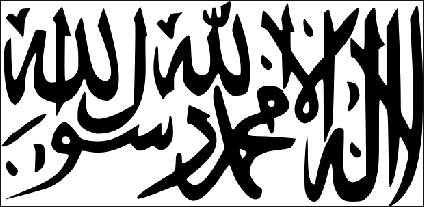 The “shahada” is the basic statement of Muslim belief and the first of the Five Pillars of Islam. Confirming a belief in God it goes: "there is no God but Allah, and Muhammad is the messenger of God." It is often featured in calligraphy artwork in mosques. According to Sunni beliefs no person who repeats the “shahada” can be called an infidel or excluded from the Muslim community.
The “shahada” is the basic statement of Muslim belief and the first of the Five Pillars of Islam. Confirming a belief in God it goes: "there is no God but Allah, and Muhammad is the messenger of God." It is often featured in calligraphy artwork in mosques. According to Sunni beliefs no person who repeats the “shahada” can be called an infidel or excluded from the Muslim community.
The shahada is a profession of belief in one God and the prophethood of Muhammad. It is always is recited in Arabic. and repeated during prayer and on many other ritual occasions. New converts declare the “Shahadah” as a confirmation faith. Pious Muslims repeat it many times every day. The first phrase ("there is no God but Allah”) both repudiates polytheism and declares that it is a sin for any person or creature to imply they have the powers of God. The second phrase (“and Muhammad is the messenger of God”) does not imply there was anything wrong with other prophets such as Adam. Abraham and Moses but rather than Muhammad was the bearer of the final and perfect revelation from God.
The shahadah is a declaration of faith and an important part of worship, appearing in the call to prayer and in the prayer itself.. In addition to being reciting before witnesses when one become a Muslim, Muslims are expected to recite the Shahadah at least seventeen times each day as it serves as a daily reminder that there is only one God and that Muhammad is God's messenger. It is recited 14 times a day by those who meet the requirement of praying five times daily, and it is repeated at many other occasions in a Muslim's life.
According to the “Worldmark Encyclopedia of Religious Practices”: The first part of the declaration reflects absolute monotheism, Islam's uncompromising belief in the oneness, or unity, of God (tawhid). The second part of the declaration emphasizes that Muhammad is not only a prophet but also a messenger of God, the one who received a book of revelation from him. For Muslims, Muhammad is the last and final prophet, who serves as a model for the community through his life. [Source: John L. Esposito “Worldmark Encyclopedia of Religious Practices”, 2000s, Encyclopedia.com]
According to the “Encyclopaedia Judaica” The first part appears with slight modifications several times in the Qur’an. Qur’an 3:18 reads: "Allah witnessed that there is no god except Him." (Cf. Qur’an 2:255, 37:35 and elsewhere.) The second part appears only once, in Qur’an 48:29: "Muhammad is the messenger of Allah. And those who are with him are hard against the unbelievers, merciful one to another…" Like other Muslim rituals, this formula seems also to have undergone certain developments before reaching its final form. The tradition maintains that the first part of the shahada, affirming the oneness of Allah, was sufficient to indicate the conversion of Arab polytheists to Islam because it is unambiguous in the rejection of their former belief in multiple gods. When the call to Islam was directed at Christians and Jews, this part of the shahada was no longer sufficient: an affirmation of Allah's oneness by monotheist Jews or Christians does not indicate their conversion to Islam because Christians and Jews may identify with the first part of the shahada without changing their religious affiliation. For a Jew or a Christian, therefore, the acknowledgment of Muhammad's prophethood was considered essential. [Source: Haïm Z’ew Hirschberg, “Encyclopaedia Judaica”, 2000, Encyclopedia.com]
Muslim Prayers — the Second Pillar
The second pillar of Islam is prayer, or worship (salat). Islam has few rituals other than prayer. There are no sacraments. Prayer consists of defined movements and recitations of passages of the Qur’an. The cycles of prayer begins after a Muslim orients himself or herself towards Mecca. The prescribed prayers are recited in Arabic and are accompanied by a series of ritual body movements meant to demonstrate submission to God: standing, bowing, kneeling, and full prostration. Muslims say the prayers at five prescribed times a day, always while facing in the direction of Mecca.
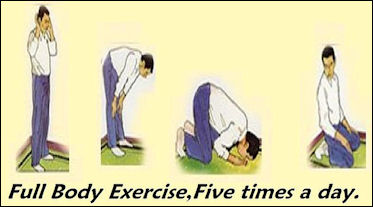 Prayers are preceded by a ritual ablution, and, unless the prayer is said in a mosque, a ritual purification of the ground is achieved by the unrolling of a clean prayer rug. Although it is permissible to pray almost anywhere, men pray in congregation at mosques whenever possible, especially on Fridays. Women are not required to pray in public but may attend worship at mosques, which maintain separate sections for women. [Source: Library of Congress]
Prayers are preceded by a ritual ablution, and, unless the prayer is said in a mosque, a ritual purification of the ground is achieved by the unrolling of a clean prayer rug. Although it is permissible to pray almost anywhere, men pray in congregation at mosques whenever possible, especially on Fridays. Women are not required to pray in public but may attend worship at mosques, which maintain separate sections for women. [Source: Library of Congress]
Prayers are intended to be a public avowal of faith and membership of the Muslim community. According to sura 62:9-10: “O you who believe. When the call is heard for prayer on the day of the congregation, hurry to remembrance of God and leave your trading. That is better for you if only you knew. And when the prayer is ended, then disperse in the land and seek God’s bounty, and remember God much so that you be successful.”
Prayers can be done anywhere, except a place regarded as unclean, but are ideally done in a mosque. A prayer at a mosque is supposed to bring 27 times more blessing than a prayer outside a mosque. Once a Muslim begins his prayers he is not supposed abandon them even if he or she are approached by a poisonous snake. Women who see their child in danger while they pray and supposed to keep praying while they make the rescue.
See Separate Article: MUSLIM PRAYERS AND MOSQUE WORSHIP africame.factsanddetails.com
Zakat — the Third Pillar
The third pillar of Islam, zakat (almsgiving), is required of all Muslims. The faithful are expected to give in proportion to their wealth. In various historical periods, zakat assumed the status of a tithe that mosques collected and distributed for charitable purposes. In addition to zakat, Muslims are encouraged to make free-will gifts (sadaka , from the Arabic sadaqa). [Source: Library of Congress]
Almsgiving consists of a variety of donations, traditionally to the poor, debtors, slaves, wayfarers, beggars, and charitable organizations. Once obligatory, although not strictly a tax, almsgiving in modern times is voluntary but usually expected. Today, zakat generally involves giving away a certain percentage of one's income and savings to the poor.It is regarded as a form of worship and an expression of sympathy and a sharing in God's blessing. It has traditionally been practiced in association with Ramadan, when the rich traditionally held feasts for the poor, but today is very institutionalized and resembles paying taxes, with government and mosque bureaucracies collecting much of the money and dispensing it as a kind of welfare.
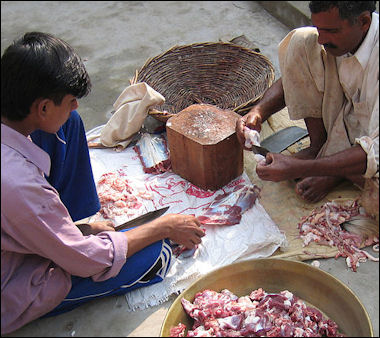
meat for the poor during Kurban bayrum According to the BBC: Zakat “is regarded as a type of self-purification. It does not refer to charitable gifts given out of kindness or generosity, but to the systematic giving of 2.5 percent of one's wealth each year to benefit the poor. The 2.5 percent rate only applies to cash, gold and silver, and commercial items. There are other rates for farm and mining produce, and for animals. [Source: BBC, September 8, 2009 |::|]
“The benefits of Zakat, apart from helping the poor, are as follows; 1) Obeying God; 2) Helping a person acknowledge that everything comes from God on loan and that we do not really own anything ourselves; 3) And since we cannot take anything with us when we die we need not cling to it; 4) Acknowledging that whether we are rich or poor is God's choice; 5) So we should help those he has chosen to make poor; 6) Learning self-discipline; 7) Freeing oneself from the love of possessions and greed; 8) Freeing oneself from the love of money; 9) Freeing oneself from love of oneself; 10 ) Behaving honestly” |::|
In most Muslim countries legal almsgiving today is an institution of only historical interest, having been superseded almost everywhere by modern legislation. Zakat was originally a religious tax of 1 to 5 percent of a individuals earnings. It was an obligation often conjoined with prayer and was distinguished from the free will giving. Muslims regarded it not as a tax but rather as a “loan” made to God — in addition to taxes to authorities — specifically to help the poor and needy. These days Sunnis are expected to hand over 2.5 percent of their income; Shiites, 10 percent. In some Arab and Muslim countries, zakat replaces taxes.
In most places and most countries individuals are left on their own to make their own charitable contributions with no civil penalties of they don’t pay up. Donations come in the form of cash, jewels, cars and even kidneys. Rich Gulf Arabs have donated millions of dollars. Telethons in the rich gulf states have amassed more than a $100 million in a few hours. In the old days slaves and prisoners were sometimes freed as a zakat gesture.
Sunnah on Charity

There are about 700 verses in the Qur’an the refer to zakat. Among them is: "O ye who believe! Give of the good things which ye have earned" Zakat shows a willingness to "purify" earthly wealth and take on social responsibility for the Muslim community. Providing debt relief and helping strangers are both considered forms of zakat.
The Sunnahs are the practices and examples drawn from the Prophet Muhammad's life. Along with the Hadiths they are the most important texts in Islam after the Qur’an. They must adhere to a strict chain of narration that ensures their authenticity, taking into account factors such as the character of people in the chain and continuity in narration. Reports that fail to meet such criteria are disregarded.
The Sunnah reads: “When God created the earth it began to shake and tremble; then God created mountains, and put them upon the earth, and the land became firm and fixed; and the angels were astonished at the hardness of the hills, and said, "O God, is there anything of thy creation harder than hills?" and God said, "Yes, water is harder than the hills, because it breaketh them." Then the angel said, "O Lord, is there anything of thy creation harder than water?" He said, "Yes, wind overcometh water: it does agitate it and put it in motion." They said, "O our Lord! is there anything of thy creation harder than wind?" He said, "Yes, the children of Adam giving alms: those who give with their right hand, and conceal from their left, overcome all." [Source: Charles F. Horne, ed., The Sacred Books and Early Literature of the East, (New York: Parke, Austin, & Lipscomb, 1917), Vol. VI: Medieval Arabia, pp. 11-32]
“The liberal man is near the pleasure of God and is near paradise, which he shall enter into, and is near the hearts of men as a friend, and he is distant from hell; but the niggard is far from God's pleasure and from paradise, and far from the hearts of men, and near the fire; and verily a liberal ignorant man is more beloved by God than a niggardly worshiper.
“A man's giving in alms one piece of silver in his lifetime is better for him than giving one hundred when about to die. Think not that any good act is contemptible, though it be but your brother's coming to you with an open countenance and good humor.
“There is alms for a man's every joint, every day in which the sun riseth; doing justice between two people is alms; and assisting a man upon his beast, and with his baggage, is alms; and pure words, for which are rewards; and answering a questioner with mildness is alms, and every step which is made toward prayer is alms, and removing that which is an inconvenience to man, such as stones and thorns, is alms.
“The people of the Prophet's house killed a goat, and the Prophet said, "What remaineth of it?" They said, "Nothing but the shoulder; for they have sent the whole to the poor and neighbors, except a shoulder which remaineth." The Prophet said, "Nay, it is the whole goat that remaineth except its shoulder: that remaineth which they have given away, the rewards of which will be eternal, and what remaineth in the house is fleeting." Feed the hungry, visit the sick, and free the captive if he be unjustly bound.
Ramadan — the Fourth Pillar
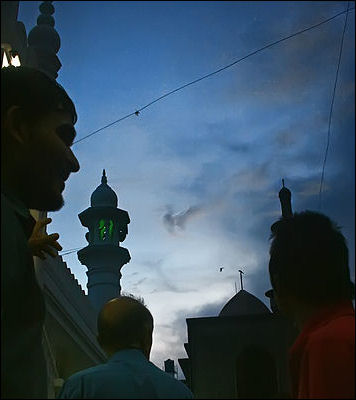 The fourth pillar of Islam is the fast of Ramadan. Ramadan is the month-long Muslim fast or more properly the ninth month of the Muslim year in which the fast takes place. According to Islamic custom, every able bodied Muslim is required to fast during the daylight hours or "as long as a white thread can be distinguished from a black one."
The fourth pillar of Islam is the fast of Ramadan. Ramadan is the month-long Muslim fast or more properly the ninth month of the Muslim year in which the fast takes place. According to Islamic custom, every able bodied Muslim is required to fast during the daylight hours or "as long as a white thread can be distinguished from a black one."
Abstinence from dawn to dusk from all food and beverages during the Islamic month of Ramadan is the fourth pillar of the faith required of Muslims. Persons who are ill; women who are pregnant, nursing, or menstruating; soldiers on duty; travelers on necessary journeys; and young children are exempted from the fast. However, adults who are unable to fast during Ramadan are expected to observe a fast later. [Source: Library of Congress]
Ramadan is a period of spiritual renewal, and the daytime fasting is meant to help concentrate a Muslim's thoughts on religious matters. Many mosques, especially in urban areas, sponsor special prayer meetings and study groups during the month. The evening meal that breaks the fast has special religious significance and also is an occasion for sharing among families and friends. Muslims who can afford to do so often host one or more fast-breaking meals for indigents during Ramadan. The month of fasting is followed by a three-day celebration Eid al Fitr.
Ramadan commemorates the night when Allah revealed the first portion of the Qur’an to the Prophet Muhammad in A.D. 610. It is a time a sacrifice that leads to renewal and strength and is intended to teach Muslims discipline, subdue their passions, cleanses their spirit and humble them by letting them experience what it is like to be poor.
Fasting represents both a submission to God and a willingness to sacrifice oneself for God. By going through the experience together, Muslims are expected to develop a stronger bond with one another and a sense of community. Some religious scholars have suggested that Muhammad had Christian relatives and that the notion of fasting as a form of penitence was picked up from Christian ascetics who lived in the desert.
See Separate Article: RAMADAN africame.factsanddetails.com
The Hajj — the Fifth Pillar
The fifth pillar of Islam is the hajj . Each Muslim who is financially and physically able is expected at least once in his or her lifetime to make the pilgrimage to Mecca and participate in prescribed religious rites performed at various specific sites in the holy city and its environs during the twelfth month of the lunar calendar. In one of their most important rites, pilgrims pray while circumambulating the Kaaba, the sanctuary Muslims believe Ibrahim (Abraham) and his son Ismail (Ishmael) built to honor the one God. During the hac , pilgrims sacrifice domesticated animals such as sheep and distribute the meat among the needy. Known as the Feast of Sacrifice, Kurban Bayrami (in Arabic, Id al Adha), this occasion is celebrated not only by the pilgrims but by all Muslims, and is observed in Turkey as a national holiday. The returning pilgrim is entitled to use the honorific haci (in Arabic, hajji ) before his or her name, a title that indicates successful completion of the pilgrimage. [Source: Library of Congress]
The Hajj is the annual pilgrimage to Mecca by Muslims fulfilling one of the pillars of Islam and answering the edict from the Qur’an: “And proclaim unto mankind the Pilgrimage. They will come unto thee on foot and on every lean camel...from every deep ravine.” The Hajj literally means “to continuously strive to reach one’s goal.” One of five pillars of Islam, it is regarded by many Muslims as a kind of dress rehearsal for the Judgement Day and incorporates elements of the other four "five pillars of Islam." [Source: Muhammad Abdul-Rauf, National Geographic November 1978; Thomas Abercrombie, National Geographic, January 1966]
Participation in the Hajj is both a personal, spiritual experience for an individual and a chance to become part of global Muslim community by performing common rituals with hundred of thousands of Muslim from all over the world. It is a great honor to go on the Hajj. When word gets out in a Muslim community that someone is going people call them to offer their congratulations and often ask the future pilgrim to say special prayers for them.
One pilgrim wrote in the Chicago Tribune that attending the Hajj “was the most powerful and immense spiritual experience of my entire life. There is not a day that goes by that I do not think of my time in Mecca.” A Mecca resident told National Geographic, “It’s a wonderful experience, a joyous time. When people leave their worldly gains behind and come to pray in simple white garments, to realize there’s no difference between rich and poor, black and white. There’s a sense of equality. Those that attend the Hajj receive forgiveness for all their past sins.”
See Separate Articles Under THE HAJJ: africame.factsanddetails.com
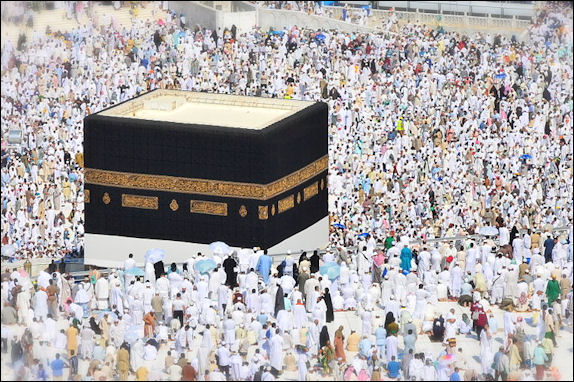
Circling the Kaaba during the Hajj
Lesser Pillars and Muslim Law
In addition to these five duties Muslim are forbidden to eat pork, drink alcohol, gamble and practice usury. Mislims are also expected to avoid unethical behavior such as slander or perjury. Above and beyond that Sharia — a system of laws and rules for living — is expected to be followed, setting forth an ethical ideal of which one is supposed to conform to. Being a good “Muslim citizen” and abiding by Sharia firms up a worshippers position in the Muslim community and entitles him or her to the privileges given Muslims by God.
The lesser pillars of the faith, which all Muslims share, are jihad, or the permanent struggle for the triumph of the word of God on earth, and the requirement to do good works and to avoid all evil thoughts, words, and deeds. In addition, Muslims agree on certain basic principles of faith based on the teachings of the Prophet Muhammad: there is one God, who is a unitary divine being in contrast to the trinitarian belief of Christians; Muhammad, the last of a line of prophets beginning with Abraham and including Moses and Jesus, was chosen by God to present God's message to humanity; and there is a general resurrection on the last, or judgment, day. [Source: Helen Chapin Metz, Persian Gulf States: A Country Study, Library of Congress, 1993]
The permanent struggle for the triumph of the word of God on earth — the jihad — represents an additional duty of all Muslims. Although this concept continues to be used to justify holy wars, modernist Muslims see the jihad in a broader context of civic and personal action. In addition to specific duties, Islam imposes a code of ethical conduct that encourages generosity, fairness, honesty, and respect and that forbids adultery, gambling, usury, and the consumption of carrion, blood, pork, and alcohol.
During his lifetime, Muhammad held both spiritual and temporal leadership of the Muslim community. Religious and secular law merged, and all Muslims have traditionally been subject to sharia, or religious law. A comprehensive legal system, sharia developed gradually through the first four centuries of Islam, primarily through the accretion of precedent and interpretation by various judges and scholars. During the tenth century, legal opinion began to harden into authoritative rulings, and the figurative bab al ijtihad (gate of interpretation) closed. Thereafter, rather than encouraging flexibility, Islamic law emphasized maintenance of the status quo.
Image Sources: Wikimedia Commons
Text Sources: Internet Islamic History Sourcebook: sourcebooks.fordham.edu Arab News, Jeddah; “Islam, a Short History” by Karen Armstrong; “A History of the Arab Peoples” by Albert Hourani (Faber and Faber, 1991); “Encyclopedia of the World Cultures” edited by David Levinson (G.K. Hall & Company, New York, 1994); “World Religions” edited by Geoffrey Parrinder (Facts on File Publications, New York); “Encyclopedia of the World’s Religions” edited by R.C. Zaehner (Barnes & Noble Books, 1959); Metropolitan Museum of Art, National Geographic, BBC, New York Times, Washington Post, Los Angeles Times, Smithsonian magazine, The Guardian, Al Jazeera, Times of London, The New Yorker, Time, Newsweek, Reuters, Associated Press, AFP, Lonely Planet Guides, Library of Congress, Compton’s Encyclopedia and various books and other publications.
Last updated April 2024
